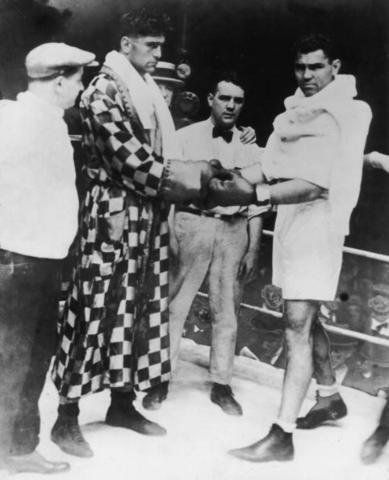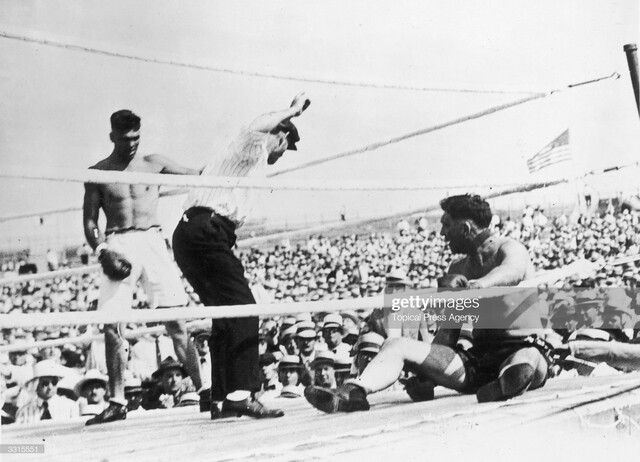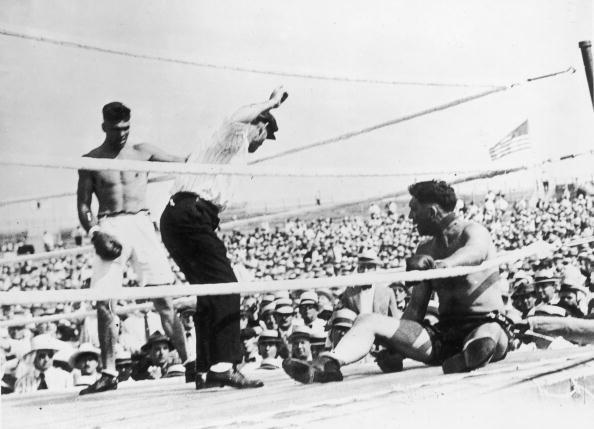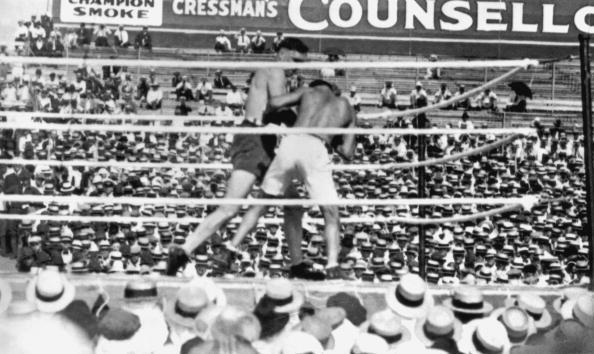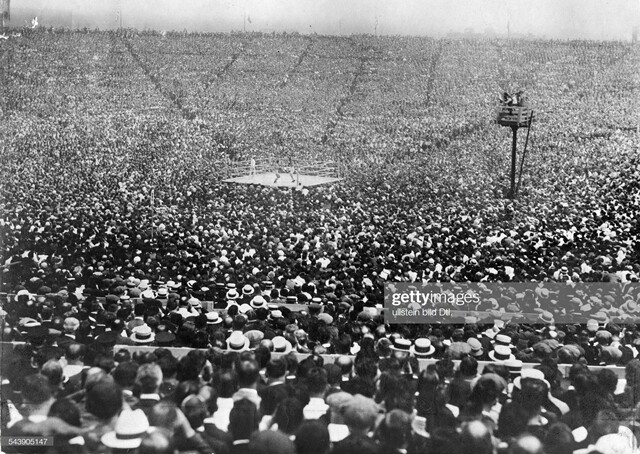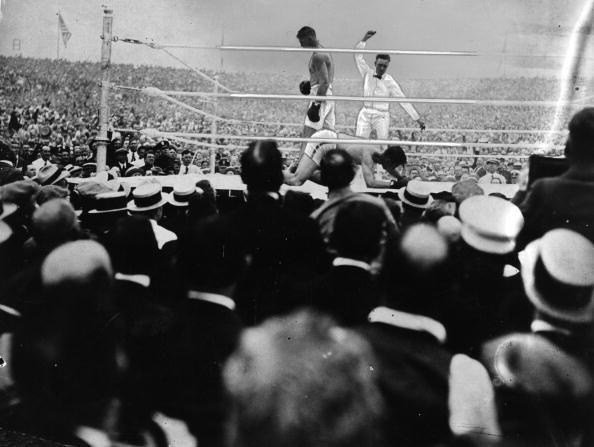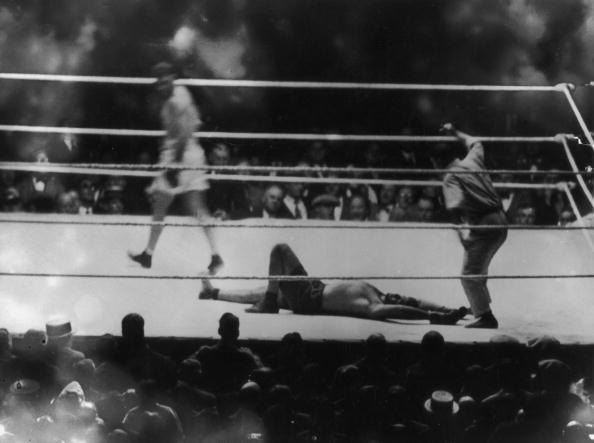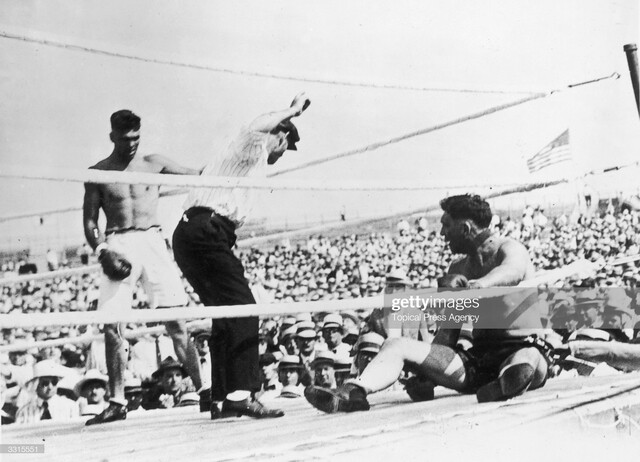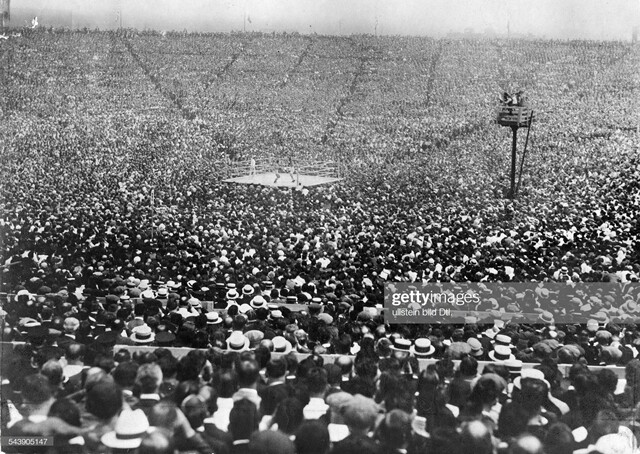A little over 100 years ago, Jack Dempsey became the heavyweight boxing champion of the world, defeating four-year defending champion Jess Willard in a title fight by way of corner retirement between the third and fourth rounds.
At the time, the boxing match was one of the largest in history and one of the most ostensibly lopsided as well.
Dempsey, standing just six feet, one inch tall and weighing only 187 pounds, was at a disadvantage in many of his heavyweight fights. His opponents were often significantly larger than him in both stature and weight—none more so than Willard, who stood six feet, six inches and weighed 245 pounds.
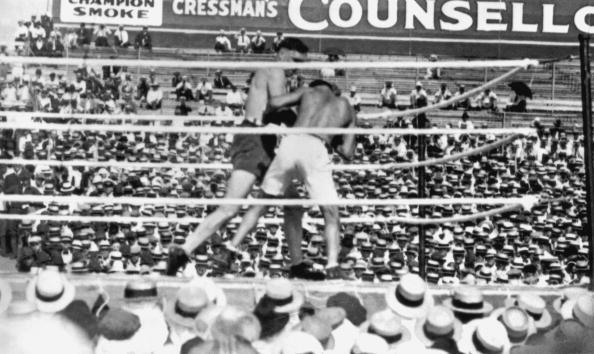
Jess Willard (left) in action against Jack Dempsey during their world heavyweight title fight at Toledo, Ohio, on July 4, 1919. Dempsey won the fight at the end of the third round and he held onto the title until 1926. (Photo by Topical Press Agency/Getty Images)
Due to the disparity in stature, the champion was not particularly worried by his smaller opponent,reportedly telling people before their bout, “This will be the easiest fight of my career.”
While not the easiest, the fight on July 4, 1919, was certainly shocking for Willard.
In the first 30 seconds of the fight, Dempsey scored a knockdown, and he would knock the champion off his feet six more times before first round ended. The mauling continued until the fight was stopped after Willard couldn’t rise from his chair to start the fourth;he had suffered a broken jaw, a broken cheek, broken ribs, and hearing loss, which proved to be permanent.
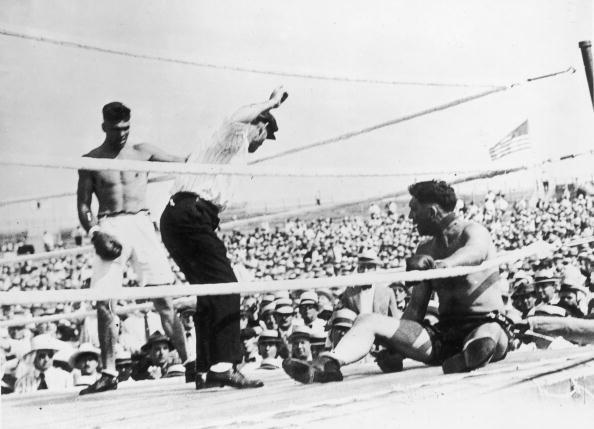
Jess Willard sits up after being knocked to the floor by Jack Dempsey during their world heavyweight title fight at Toledo, Ohio, on July 4, 1919. Dempsey won the fight at the end of the third round after Willard's second threw in the towel. (Photo by Topical Press Agency/Getty Images)
Although not technically a win by knockout, the fight is remembered as one of the worst beatings in boxing history.
“Tall men come down to my height when I hit 'em in the body,” Dempseysaid.
However, prior to his title fight with Willard and before he revolutionized the sport of boxing and prize fighting, Dempsey was just a small kid with big dreams who fought through challenges that life as a pioneer kid inherently presented. His parents had migrated west as Latter-day Saint pioneers, and he grew up in a large, deeply impoverished family. Facing overwhelming odds, Dempsey pulled off upset after upset. History remembers his wins inside the ring but just as often fails to include the noteworthy ones outside it.
The Manassa Mauler
Growing up poor in the newly settled west, Dempsey often had trouble finding fights close to home. And as he grew in skill and popularity, he was often forced to travel east to find true contenders. In his early fighting years, necessitated by his lack of money, he snuck onto rail cars to avoid paying for passage.
Dempsey’s father, who was taught by missionaries in the 1870s, was a convert to The Church of Jesus Christ of Latter-day Saints. He moved westward as a result, eventually settling in Manassa, Colorado, where Dempsey was born.
“In spite of all the religion,” Dempsey wrote in his autobiography Round by Round, “Manassa was like every other pioneer town, tough and ready for anything."
This served as an apt description for Dempsey as a fighter, too, and Dempsey was fittingly dubbed the Manassa Mauler for his exploits as a boxer.
Randy Roberts, in his book Jack Dempsey: The Manassa Mauler, wrote:
“Although religion lay behind Hyrum’s [Hiram] migration, he was not the sort of man to remain very religious very long. He accepted all the laws of the Mormon faith on principle, but his body was not as strong as his faith. He enjoyed worldly pleasures too much to remain faithful to any strict religion. He drank whiskey and coffee, smoked, and indulged in other vices. He became a Jack Mormon, one who does not live by the book. When confronted with this paradox he would grin and drawl, ‘I’m just too weak to live up to those rules.’”
In his autobiography, Dempsey wrote about his father’s beliefs, stating:
“Any inconsistency between his religion and his manner of living never bothered him. ‘The Mormon religion,’ he would explain, ‘is a good thing. It shows you what you ought to do. That’s the main thing, always to know what you ought to do. Of course, you don’t always do it. Nobody does. That’s human nature. But at least you always ought to know what’s right. I reckon that’s what religion is for.’”
Like his father, while not particularly devout, Dempsey considered himself a Latter-day Saint and practiced some of the religion’s teachings.
“I’m proud to be a Mormon,”he said. “And ashamed to be the Jack Mormon that I am.”
Religious Roots
Dempsey remembered being taught the fundamentals of the gospel early on in life, writing in his biography:
“Regularly the Teachers of the Mormon church, corresponding to preachers in other religions, visited our house to see how things were going. They would exhort my father to do right, as they saw the right. For us children there were many rules and precepts. Things to do, and things not to do. If you didn’t do as you were supposed to, you were weak, but if you behaved yourself properly you were strong. It was up to you. “You weren’t supposed to lie. Since we were rarely punished and had little to be afraid of, that wasn’t particularly hard for us. You were supposed to keep your word. That was harder!”
Dempsey was baptized at the age of 8 and he continued to practice parts of the religion.
Prayer was among the religious practices that he was taught growing up. "Every evening we had family prayers,” Dempsey remembered. “A blessing was always asked at the beginning of each meal."
And, according toDaily Mail, he continued to do so throughout the rest of his life.
“I've never eaten a meal or gone to bed in my life without saying a prayer,” he said. “Those prayers have been answered a thousand times.”
When he was 13, Dempsey’s familyuprooted from Manassa and moved to Provo, Utah, and before dropping out of school, Dempsey held aspirations of attending Brigham Young University. In his autobiography, he said:
“When Clarence and I graduated from the eighth grade, I still wanted, in a not very definite way, to go on to high school and prepare for Brigham Young University. I had an idea I’d like to take medical training and perhaps become a doctor."
His desire to become a boxer outweighed his desire for education, however, and he chose to follow his dream of becoming a heavyweight champion. However, Dempsey’s lack of education bothered him later in life, especially after winning the title.
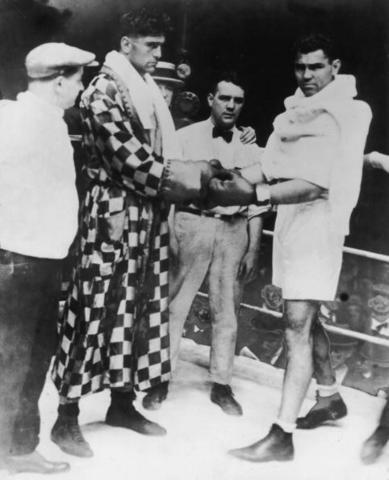
American world heavyweight champion boxer Jack Dempsey (1895-1983) with Argentine heavyweight champion Luis Angel Firpo (left) before their match at the Polo Grounds in New York, September 14, 1923. Dempsey won with a knockout after a bout lasting only 3 minutes and 57 seconds. (Photo by Hulton Archive/Getty Images)
Dempsey also fasted once every month, even during his days as a serious boxer when he had a specific dietary regimen.
“One day each month I ate nothing at all,” Dempsey wrote. “Jimmy saw nothing to object to in the custom. It seems to be good for the digestion to have a complete rest once in a while; at any rate the custom worked well with me."
A Transformative Force
Throughout his reign as heavyweight king during the roaring '20s—a golden age for sports as much as for the economy—Dempsey’s fame rivaled even that of Babe Ruth, who was at the peak of his hitting powers. The Des Moines Register published the results of apopularity poll in 1928 that listed Dempsey at number one, Ruth at number two and Gene Tunney, who had just beaten Dempsey, at number three.
“Meeting him was like meeting Babe Ruth,”said boxer “Irish” Johnny Turner. “I had read a lot about him, and I was in awe of him.”
Dempsey’s years at the top transformed prize fighting. His fight with Georges Carpentier in 1921 became the first-ever boxing match to capture a million dollar gate, earning an unheard of$1,789,238. Incredibly, five of Dempsey’s fights would earn an excess of a million dollars in revenue.
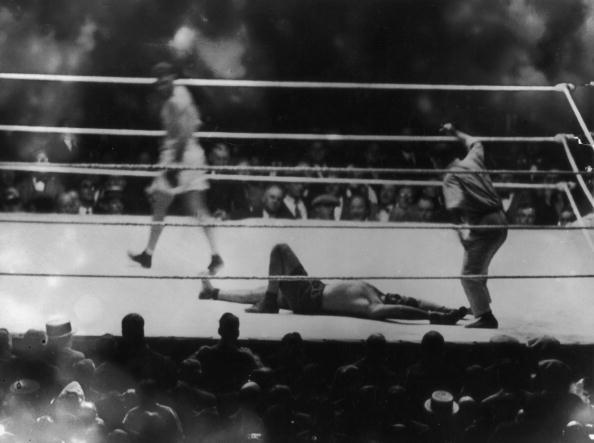
Argentine heavyweight champion Luis Angel Firpo lies knocked out by American world heavyweight champion boxer Jack Dempsey (1895-1983) at the end of their match at the Polo Grounds in New York, September 14, 1923. The bout lasted only 3 minutes and 57 seconds. (Photo by Topical Press/Hulton Archive/Getty Images)
A Gentleman and a Sportsman
Dempsey is often remembered for his vicious tactics in the ring. His ruthless stratagems inspired more recent heavyweight champion Mike Tyson, who said in an interview with the Guardian, "They were all so vicious, man. Jake LaMotta, Henry Armstrong, Carmen Basilio, Sugar Ray. . . . Sugar Ray was vicious. But Jack Dempsey more than anyone. All these guys let you know they wanted to murder you, and they'd take shots from you, over and over, and over, get beat senseless, just so they could get theirs in. Sugar Ray maybe most of all. But Dempsey? He wanted to maim you. He didn't want you dead. He wanted you to suffer. He wanted to shatter your eye socket, destroy your cheeks, your chinbone. That's what I learned from Mr. Dempsey, and I believe I learned it well."
Despite Tyson’s description and Dempsey’s famously violent fighting style, which had a ruthlessness that no one can deny, Dempsey was often described as a kind person, even as a gentleman during his later life.
After beating Bill Brennan in 1918, Dempsey recalls on his autobiography seeking him out after the fight.
“I went to Brennan’s dressing-room as soon as I could get away from the ring to see how badly his ankle was hurt. “’I’m sorry, Bill,’ I said. ‘It had to be one or the other of us.’ “’That’s okay, Jack,’ he answered. ‘It’s all in the game.’”
And directly after losing his title to Gene Tunney in 1926, he congratulated his opponent with grace:
“Gene Normile, as my spokesman, issued a statement for me after the fight. ‘I am glad,’ he gave my message, ‘that the championship has passed into the hands of an American and a fine fighter. I wish him the best of luck.’”
Boxing.com related other accounts of Dempsey’s graciousness, the first as told by George Cooney, a fellow boxer.
“He was an awesome man and champion, but I was too young to recognize his greatness," said Cooney. "He told me I was big and tall and would have a nice career if I worked hard. He was kind of quiet, not very outspoken, but there was something about him that stood out."
The article continues:
“When Dempsey passed away from a heart ailment at the age of 87 in 1983, the New York Times wrote that ‘during his long retirement, [he] set a standard of dignity rarely equaled by a former champion.’”
A Commendation from a Prophet
Dempsey’s accolades in the ring even gained the notice of David O McKay.
McKay, while struggling as a missionary in Scotland years earlier, had a spiritual experience that provided him strength. McKayrelayed it to Dempsey and offered him praise, saying:
“As we were coming back into town, I saw on my right an unfinished dwelling, over the front door of which was a stone on which there was some carving. That was most unusual, so I said to Elder [Peter G.] Johnston: ‘I’m going to see what that is.’ I was halfway up the graveled walk when there came to my eyesight a striking motto carved in stone—it read ‘WHATE’ER THOU ART, ACT WELL THY PART.’ . . . I thought about this motto, ‘Whate’er Thou Art, Act Well Thy Part,' and took it as a direct message to me, and I said to myself, or the Spirit said to me, ‘You are a member of The Church of Jesus Christ of Latter-day Saints; more than that—you are here in the Mission Field as a representative of the Church, and you are to act well your part as a missionary, and you should get into the work with all your heart.’ I then said to Jack Dempsey: ‘I congratulate you as a man who has acted well your part—one who has brought honor to your profession.’”
Bringing “honor to your profession” is advice which Dempsey first received from his mother, Mary Celia Dempsey, who had high expectations and hopes for all her children.
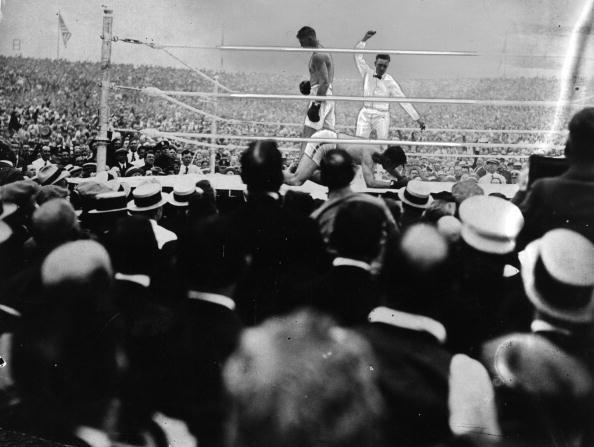
The referee counts out Georges Carpentier (1894-1975) after the knock-out blow from Jack Dempsey in the fourth round of their World Heavyweight title fight at Jersey City on July 2, 1921. (Photo by Hulton Archive/Getty Images)
“My mother had always wanted me to be a ‘good citizen,’” Jack Dempsey wrote. “That might mean a lot of things; according to my interpretation it meant doing whatever job I undertook as well as I could. So I had to be as good a champion as I could and hold the title as long as possible."
And that he did, holding on to his championship title for seven years after beating Willard. Today, Dempsey is remembered as one of the greatest boxers of all time, and with what he had to overcome as a boxer and a person, he’s David and Goliath personified, a sports icon for the ages.
Lead image of world champion heavyweight boxer Jack Dempsey in action against Tom Gibbons during their fight at Shelby, Montana, in July 1923. (Photo by Topical Press Agency/Getty Images)
